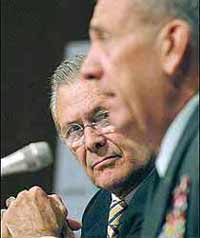 Defending the war against Iraq, the Bush administration said Wednesday that information on Saddam Hussein's alleged illicit weapons programs was solid even though one of President Bush's claims was based on a forgery.
Defending the war against Iraq, the Bush administration said Wednesday that information on Saddam Hussein's alleged illicit weapons programs was solid even though one of President Bush's claims was based on a forgery.
Defense Secretary Donald Rumsfeld said the administration decided to use force in Iraq because intelligence about the threat of Saddam's rule was seen in a different perspective after the terrorist attacks on Sept. 11, 2001.
"The coalition did not act in Iraq because we had discovered dramatic new evidence of Iraq's pursuit of weapons of mass murder," Rumsfeld said while testifying before the Senate Armed Services Committee. "We acted because we saw the existing evidence in a new light through the prism of our experience on Sept. 11."
Rumsfeld was asked about President Bush's prewar claim, now known to be based on faulty evidence, that Iraq had sought uranium from Africa before the war. Rumsfeld said one erroneous report does not invalidate the body of intelligence used to justify going to war.
"I think the intelligence has been quite good, and I don't think the fact that there's an instance where something was inaccurate ought to in any way paint a broad brush on the intelligence that we get and suggest that that's a pattern or something. It's not," Rumsfeld said.
Speaking in South Africa, Bush also predicted that proof of Saddam's weapons programs would yet be found. More than two months of searching in postwar Iraq have turned up little that would validate his assertions that Iraq had chemical and biological weapons and a program to develop nuclear weapons.
"There's no doubt in my mind that when it's all said and done the facts will show the world the truth," Bush said at a news conference in Pretoria during his five-nation African tour. "There's going to be, you know, a lot of attempts to try to rewrite history, and I can understand that. But I'm absolutely confident in the decision I made."
Bush did not address his assertion, made during his State of the Union speech in January, that Saddam had sought uranium from Africa. That statement rested largely on documents, alleging contacts between officials in Iraq and Niger, that were later determined to be forgeries.
Rumsfeld, in a terse exchange with Sen. Mark Pryor, D-Ark., said he learned only "within recent days" that the Africa claims were based on faulty evidence. UN officials determined the documents were forgeries before the war.
In a BBC interview from South Africa, Secretary of State Colin Powell said he did not raise the uranium allegation in his Feb. 5 appearance before the UN General Assembly because of the controversy it had generated.
"As we looked at all that we knew about it, it did not seem to be the kind of claim that I should take into the UN," Powell said. When asked whether he was concerned about the truthfulness of the allegation, Powell replied: "The question is not truthfulness. The question is credibility at a moment in time."
Before Bush gave the January speech, some US intelligence analysts had decided the claim was not credible, officials have said. Accounts have differed as to who in the White House was told of this determination.
This week, the White House said the statement should not have been in Bush's address, leading to calls from Democrats in Congress for a broader investigation into the administration's handling of prewar intelligence. Already, several committees are conducting inquiries.
"It seems to me absolutely startling, and I think we would all want to know how it could possibly have stayed there in the basement of the (CIA) while policy-makers in the upper floors were making these statements," said Sen. Carl Levin, D-Mich., vice chairman of the Armed Services Committee, while questioning Rumsfeld.
The CIA's inspector general is also investigating the specific handling of the uranium information, officials said.
White House spokesman Ari Fleischer said, "This type of information should not have risen to the level of a presidential speech."
But, he added, "This is a classic issue of hindsight is 20-20."
Bush said, "There is no doubt in my mind that Saddam Hussein was a threat to the world peace. And there's no doubt in my mind that the United States ... did the right thing in removing him from power."
Still, some have claimed the evidence was manipulated or misrepresented to build a case for war.
Greg Thielmann, an official with the State Department's intelligence bureau who retired last year, told an Arms Control Association forum on Wednesday that when it came to Iraq, the administration took an approach that seemed to say, "We know the answers, give us the intelligence to support those answers."
(China Daily July 10, 2003)
|

